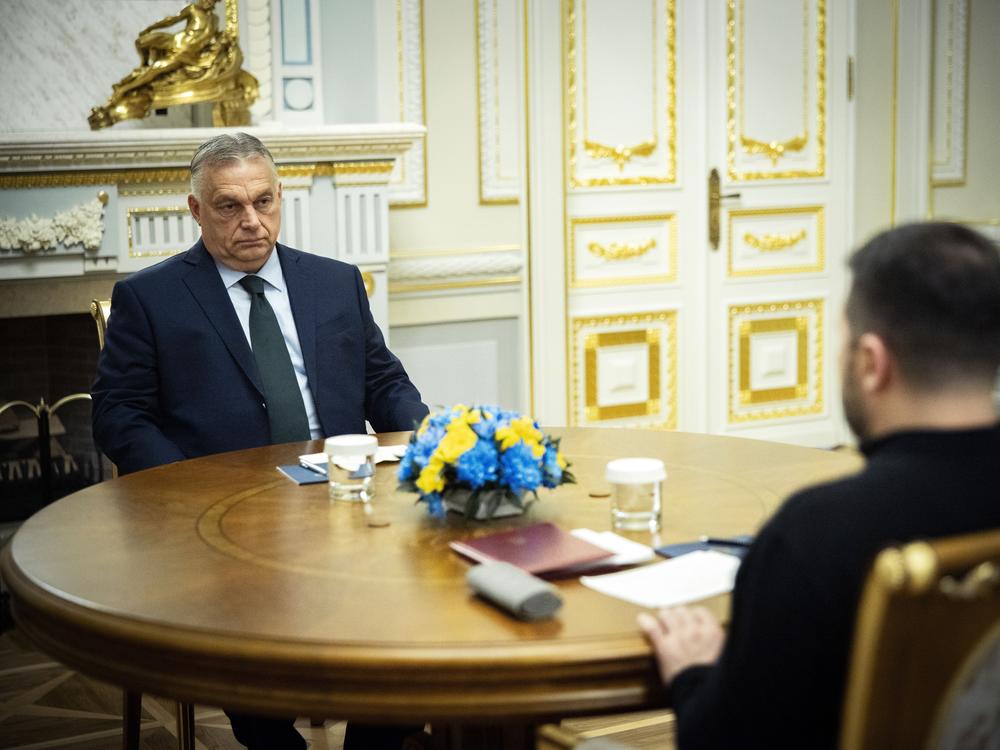Section Branding
Header Content
Hungary's Orbán in Kyiv for talks with Zelenskyy in first visit since the war began
Primary Content
BUDAPEST, Hungary — Hungarian Prime Minister Viktor Orbán was in Kyiv on Tuesday for talks with Ukrainian President Volodymyr Zelenskyy, his first visit to the neighboring country since Russia's full-scale invasion in February 2022 as Budapest has repeatedly broken ranks with the rest of the European Union and leaned toward Moscow.
Orbán's visit was a rare gesture in a relationship that has long been marred by tensions. Known as Russian President Vladimir Putin's closest EU ally, Orbán has routinely blocked, delayed or watered down EU efforts to extend assistance to Ukraine and to sanction Moscow over its war, frustrating both Zelenskyy and other EU leaders.
Meanwhile, on the war's front line, Kyiv's forces are scrambling to hold at bay a Russian push in eastern Ukraine. Delays in the provision of crucial Western military aid left the Ukrainian army at the mercy of the Kremlin's bigger and better-equipped forces.
Orbán's press chief, Bertalan Havasi, who confirmed the visit early Tuesday to Hungarian news agency MTI, said the meeting will be an opportunity for building peace as Ukraine fights off Russia's invasion.
A photo issued by Orbán's press office showed the two men by themselves, facing each other across a small round table with their national flags and an EU flag against a wall.
Signaling frosty relations, Kyiv is yet to confirm Orbán's arrival, a usual protocol with VIP visits.
This comes a day after Hungary took over the six-month rotating presidency of the European Union, a position that has little real power but can be used to set the tone of the bloc's agenda. Hungarian officials have indicated that they will act as "honest brokers" in the role despite worries from some EU lawmakers that Hungary's democratic track record makes it unfit to lead the bloc.
Kremlin spokesman Dmitry Peskov played down the importance of the visit, saying Hungary "must fulfill (the) functions" of its EU presidency and adding that Moscow had no particular expectations for its outcome.
Orbán has previously accused Kyiv of mistreating an ethnic Hungarian minority in Ukraine's western region of Zakarpattia, a community he has used to justify his refusal to provide weapons to Ukraine or allow their transfer across the two countries' shared border.
The self-described "illiberal" leader has long been accused by his European partners of dismantling democratic institutions at home and acting as an obstinate spoiler of key EU policy priorities. The bloc has frozen more than $20 billion in funding to Budapest over alleged rule-of-law and corruption violations, and Orbán has conducted numerous anti-EU campaigns depicting it as an overcentralized, repressive organization.
Orbán's visit also comes as he seeks to recruit members into a new nationalist alliance that he hopes will soon become the largest right-wing group in the European Parliament. On Sunday, Orbán met in Vienna with the leaders of Austria's far-right Freedom Party and the main Czech opposition party, announcing the formation of the new group, "Patriots for Europe."
The trio would need to attract lawmakers from at least four more EU countries to successfully form a group in Europe's new parliament, which held elections in June. Right-wing nationalist parties across Europe strengthened their position in the elections, but ideological differences over the war in Ukraine and cooperation with Russia have often prevented deeper alliances among some of the parties.

